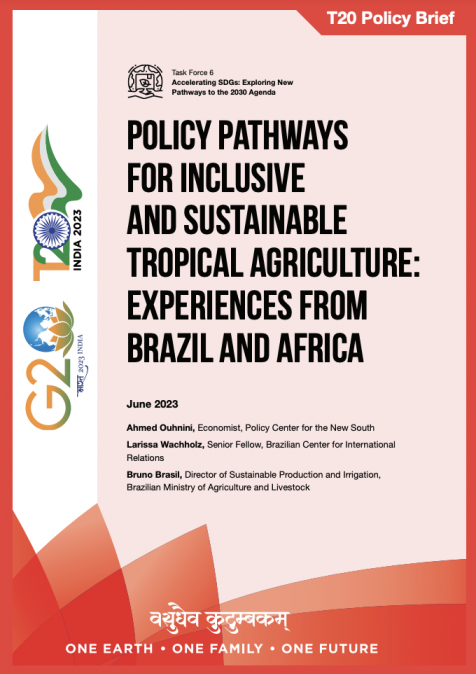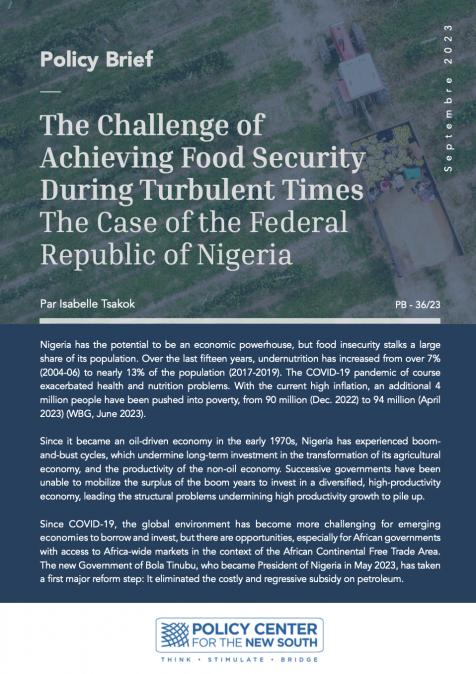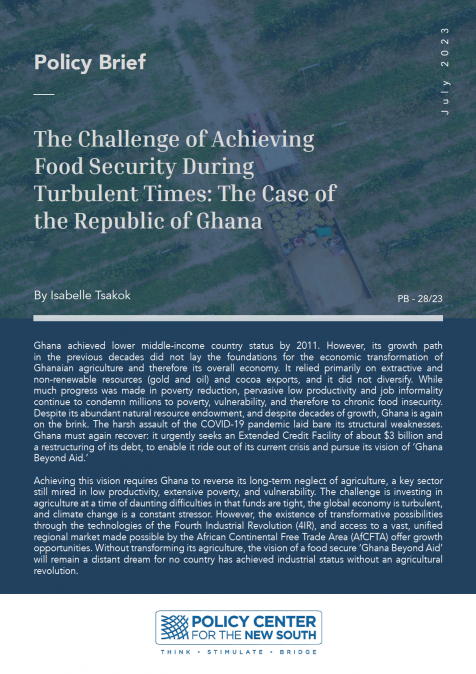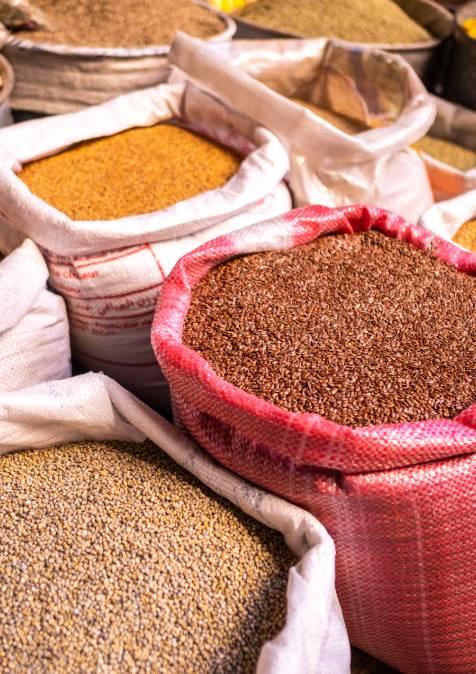Publications /
Policy Brief
This policy brief was originally published on T20 India website
Supportive policies for tropical agriculture have helped millions of small-scale farmers in Brazil step out of poverty by improving government capacity to design legal frameworks to strengthen agricultural production and family farming. Scientific and technological developments have enabled small-scale Brazilian farmers to produce food while considering local tropical conditions.
In contrast, tropical agriculture stakeholders in Africa continue to face structural challenges to productivity levels. The persistent technological gap between tropical nations in Africa and industrialised countries hinders the capacity of local producers to compete with major traditional tropical crop exporters under the current free trade conditions. Although tropical farming has evolved differently in Latin America and Africa, farmers in the two regions face similar challenges, such as insufficient investments in infrastructure, tropical deforestation as a result of economic incentives, and significant rural poverty. In many countries, promoting tropical agriculture is not a priority for governments and public policies, which results in a lack of strategy and structured investments.
Brazil and Africa could meet the increase in demand expected for tropical products, such as food and fibres, by 2050. Considering that both the country and the continent are important players in global food production systems, Brazil and Africa both have significant potential to increase their production of tropical products to meet future demand. To achieve this, the sector needs structured investment and strategically aligned policies to lay the ground for a prosperous, inclusive, and sustainable tropical agriculture. This Policy Brief compares the position of both regions within global commodity value chains and investigates additional factors that could explain successes and failures, as well as highlight best practices to promote inclusive markets for tropical farming, define prospects for underexploited new market opportunities, and identify relevant instruments to reach common goals.
1. The Challenge
Food security continues to be a crucial issue, particularly in developing countries, rendered all the more problematic by an adverse geopolitical context and the impacts of climate change. As policy-oriented think-tanks, both the Policy Center for the New South (PCNS) and the Brazilian Center for International Relations (CEBRI) have discussed how to tackle food insecurity and increase levels of domestic production. The objective is to identify solutions to improve local livelihoods and nurture the country’s capacity to participate in the global trade of agricultural products. In the context of the necessary transition to a low-carbon economy and climate change resilience, agriculture and food security are strategic fields for international forums such as the G20. These are issues on which countries of the Global South, which share common characteristics and challenges, could further cooperate. The promotion of solutions adapted to local realities and based on on-site experiences would make an important contribution to development discourses and practices. This Policy Brief aims to shed light on some of these solutions, based on an assessment of the challenges shared by Brazil and countries of Sub-Saharan Africa regarding tropical agriculture.
Tropical African agriculture continues to face structural challenges that could worsen with upcoming critical stressors induced by climate change and their effects on the pace of agricultural growth in Sub-Saharan countries. Tapping into the complexity of agrifood systems, the fragility of agro-ecosystems, and policy environments in these areas is insufficient to provide sound responses to why tropical agricultural potential in Africa is still far from being completely utilised to eradicate hunger and lift people from poverty.
Reviewing the experiences of tropical Latin American countries with comparable agro-ecological profiles experiencing similar global challenges with histories of successful agricultural transformation could help identify the pathways for agricultural development in tropical countries. Brazil is an example of such a country, having implemented policies such as the Low Carbon Agriculture plan (ABC Plan) (Ministry of Agriculture, Livestock and Food Supply 2021) to increase agricultural output and become a major supplier of agricultural products without having to expand farming area. For instance, the ABC Plan focuses on promoting the adoption of low-carbon agricultural practices and technologies by Brazilian producers and strengthening environmental compliance while leading greater production efficiency and saving land and resources. Complementarily, the Forest Code, the main policy responsible for regulating land use in Brazil, establishes the basis for native vegetation preservation and agricultural production within the same geographic space.
During the first phase of the ABC Plan, from 2010 to 2020, low-carbon agricultural practices and technologies were successfully implemented in all 27 federative units of Brazil as well as in its six biomes (Ministério da Agricultura n.d.). The ABC Plan was structured through an operational plan organised by seven programs that worked on different sustainable productive technologies: 1) recovery of degraded pastures; 2) crop-livestock-forestry integration; 3) no-tillage system; 4) biological nitrogen fixation; 5) planted forests; 6) animal waste treatment; and 7) adaptation to climate change, with the last being a transversal program to the others. Each program involved actions related to publicity campaigns, rural credit granting, capacity-building training of technicians and rural producers, technology transfer, and environmental compliance (Ministério da Agricultura 2012).
From 2010 to 2020, the ABC Plan enabled the adoption of low-carbon agricultural practices and technologies in more than 54 million hectares, mitigating the equivalent of 193.6 million tonnes of CO2eq (Ministry of Agriculture, Livestock and Food Supply 2021). For example, there was an expansion of 10.76 million hectares for integrated crop livestock forestry systems, while an additional 26.8 million hectares of degraded pastures were recovered (Ministério da Agricultura 2021). The second phase of the policy, called the ABC+ Plan, aims to expand the adoption of low-carbon agricultural practices and technologies in an additional 72.6 million hectares, 5 million heads of cattle, and 208 million m3 of animal residues, leading to the mitigation of 1 giga tonne of CO2eq from 2021 to 2030 (Ministério da Agricultura 2021).
Such policies, which promote an increase in outputs through sustainable production systems, can stimulate growth and contribute to economic emergence through effective engagement in global agricultural markets beyond perceptions and conditions that have marked domestic political landscapes.
Considering the factors that affect tropical agriculture in Sub-Saharan Africa, the comparison with Brazil would provide insights into exploring new pathways and successful case studies that could defy the predictions of skeptics regarding the potential of tropical farming systems in Africa and undo misconceptions that tropical African export crops cannot gain a significant share of the international agricultural market.
Challenges also persist in the effective dissemination of existing solutions to increase yields in a sustainable manner. Experts agree that important gaps remain to be filled in Brazil, and agriculture policy reforms are required to ensure that the sector can continue to drive growth, generate jobs, and increase the incomes of rural households, while safeguarding the sustainable use of natural capital on which agriculture depends (World Bank 2017). The difficulty of providing personalised technical assistance to local producers is a major issue, especially for small- and medium-scale farmers, whose profitability and market access capacity is lower compared to large producers. Another challenge is the cost of sustainable solutions, which require access to credit and financing—a demand which cannot be met solely through limited public resources.
It is, therefore, important in this context to identify successful solutions and assess the conditions necessary for their transfer, as well as map out common persisting challenges, which can be jointly addressed.
2. The G20’s Role
a. Building on Brazil’s experience and its promises for tropical agriculture in Sub-Saharan Africa (SSA)
Tropical production systems can be improved in a sustainable and environmentally friendly manner through the use of adaptative and mitigative technological solutions. For example, new cultivars can lead to increased crop yields, improved nutritional content, and resistance to pests and diseases as well as adverse climatic conditions. Innovative approaches such as crop-livestock-forestry integration systems and biological inputs (i.e., innoculants and biopesticides) are other key elements for reducing the use of synthetic fertilisers and mitigating greenhouse gas (GHG) emissions.
In the last two decades, Brazil has become a global agricultural powerhouse. Such historic growth in production is mostly due to the incorporation of technology in agricultural production systems, rather than the expansion of the cultivated area. Indeed, massive investments in public agricultural research have contributed to the development and adoption of systems, cultivars, and biological inputs that have sustained the competitiveness of Brazilian agriculture in some commodities (such as cassava, cotton, maize, rice, sugarcane, and soybean). The country has thus gained a significant place in agricultural world markets. Brazil is one of the leading exporters of genetically modified (GM) soybeans, corn, and cotton as well as having significant production growth (USDA 2021). According to the United States Department of Agriculture (USDA), 65 million hectares planted with GM traits are expected in the 2022–2023 crop season. During the 2019–2020 crop, the total area of GM crops reached over 53 million hectares. The adoption rates for soybeans reached 96.3 percent, followed by 91.8 percent for corn, 86.7 percent for corn, and 89.9 percent for cotton. Brazil also implemented agricultural practices such as no-till farming, crop-livestock-forestry integration (ILPF), and smart irrigation (promoting rational use of water), all of which contribute to more efficient and sustainable production. The difference in yields achieved in the country can illustrate the extent to which it is important to pave the way for the adoption of such solutions in the tropics in Sub-Saharan Africa (SSA), where similar commodities are harvested. The objective is to gain competitiveness in domestic, regional, and continental markets, starting with the African Continental Free Trade Area and later, in world markets.
b. Launching a science-based digital platform to inform the public of the benefits of biotech crops and other solutions
The demand side for genetically modified tropical food commodities is not to be neglected, as the current official discourse around the substantive opportunities offered by bioengineering relies mainly on the supply side through public and private research spending and implementing biosafety regulatory frameworks. International experiences demonstrate that the use of biotech crops in industrialised and developing countries shows that the promise of bioengineering for strengthening food security status could not materialise unless health-risk fears around biotech food products are well addressed. Until now, there is no consensus on the use and regulation of biotech crops, even in developed countries. Although their use for human consumption is globally widespread, there are some differences in how they are regulated and labeled in each country. The European Union (EU), for instance, has been more cautious in its approach to biotech crops, which is based on the precautionary principle. The regulatory framework for their approval is also more restrictive than in other parts of the world.
In Sub-Saharan Africa, misrepresentations generated by debates around biotechnologies are often extended to agricultural biotechnology activities, as genetically engineered products are marked by controversy, even in rich countries. Supporting the market acceptance of biotech crops across the tropics in Sub-Saharan Africa is crucial to ensure wider adoption rates. According to the United States Department of Agriculture (USDA), more than 50 million hectares of biotech crops were planted in Brazil in 2021, which represents almost 30 percent of the total area harvested in the world.
The G20 countries could support a network, including the FAO, the International Food and Policy Research Institute (IFPRI), and other like-minded bodies, which are guided by the 2030 Agenda for Sustainable Agriculture, to design a global digital platform as a key solution to creating linkages between policymakers, agricultural researchers, extension professionals, farmers, and consumers. The aim of this platform is to have an impact on public perception, understanding, and adoption of biotech crops, where science-based risk assessments are shared to ensure the safety for human health and the environment. It could also help promote sustainable agriculture, increase investment in biotech research, and inform policy decisions related to biotech crops.
Support designing legal frameworks on biosafety in the tropics
It is commonly assumed that assessing the biotechnology policy environment in SSA is difficult, but public spending on agricultural research and development (R&D) in tropical African countries is especially limited compared to the rest of the world, particularly in the biotechnology field. In this regard, efforts need to be made to engage countries in cutting-edge research and bring the positive traits of integrated systems, adaptative solutions, and bioengineering to the farm level. This can only be achievable and possible if there are supportive policies in place for regulating and managing these solutions.
The contributions of these solutions to agricultural productivity can be linked to the existing policy environment and the nature of legislation, the existence of research institutions that promote R&D with significant biotech content, and government bodies that govern biosafety processes. In this context, National Biosafety Frameworks (NBF) are critical to ensure the safe and responsible use of biotechnology in agriculture and food production while also protecting human health and the environment. They also provide a framework for international trade in genetically engineered commodities to ensure that imports or exports comply well with biosafety regulations. Additionally, the absence of an NBF is a serious constraint for research institutions willing to commercialise genetically engineered products, as they can face restrictions to gain approbation from regulatory authorities or because processes for application are tedious. So far, only a few countries have implemented biosafety legislation in tropical Africa, and it is worth noting that regulatory frameworks of biosafety in this area should be strengthened, especially in countries where economic growth is driven by agriculture.
The G20 could work with international organisations such as the United Nations Food and Agriculture Organization (FAO) and the World Health Organization (WHO) to develop harmonised guidelines and standards for the regulation of biotech crops, which could help promote greater consistency and transparency in the approval process in the tropics, where the promise of biotechnologies are likely to contribute to support food security status and enhance agricultural competitiveness in regional and world markets.
c. Mobilising private funds to meet tropical agriculture research needs
New innovations and technological advances, especially biotechnology and their potentials for agricultural transformation in the tropics, are posited as possessing the potential to change the reality of underinvestment in the agricultural sector. However, there has been no change during the last decade, and many studies have argued that private research in agriculture continues to remain concentrated in industrialised and developed countries while research activities in Africa remain concentrated in high-value and export-oriented tropical crops/commodities. Developing tripartite partnerships, involving the state, the private sector, and academia—such as in the case of Brazil—has also been identified as key to address the aforementioned financing and technical assistance gaps.
Moreover, it is important to address the specific requirements of tropical agriculture as they are distinct from those of temperate and rich countries. Research-oriented activities in the developed world do not meet the specific needs of tropical countries due to the singularity of agroecological systems in such areas, the nature of soil fertility and management techniques, the existence of local pests, and farming conditions predominated by small-scale family systems operating in areas that are less likely to be irrigated and less input-intensive. Such disparities in the farming systems of advanced and rich countries entail that research in temperate areas may not apply to tropical countries, and even if new technologies can be easily provided, they would experience adoption issues in the tropics.
Within this context, the G20 countries are called to circumvent the distortions of the global R&D market, which is marked by poor public expenditure in the south and limited interventions from private organisations on products grown in tropical countries, such as cassava and millets, other starchy root crops, and tubers, which require specific attention, as they play a significant role in coping with food insecurity in tropical areas. New approaches are required because of the non-performance of several research innovations proposed for developing tropical countries in Africa to support agricultural productivity for both commercial commodities and subsistence crops. By recognising that R&D outcomes in tropical agriculture are an advantage to global interest and generate greater social and economic opportunities, a joint action between research institutions in Brazil and select private biotech companies from the G20 countries could help circumvent the current distortions of the R&D market to meet the tropical agriculture needs in SSA. This implies the need for a cross-border research program that is internationally funded by developed countries to encourage private R&D in tropical agriculture which rewards private companies willing to engage in developing new technologies that are socially acceptable and easy to adopt.
As conventional and public research processes rarely include a commercialisation phase of new technologies and modalities for their adoption, it is desirable to create incentives for private companies to invest in commercialisation to guarantee the effective transfer of appropriate technologies to farmers. This joint global program could include Brazilian private sector biotechnology companies as the process by which biotech research translates to commercial applications in the field requires the early engagement of industry. It can also include support for physical infrastructure for local biotechnology institutions in tropical areas for field testing among farmers’ organisations and cooperatives and technical assistance to institutions that manage the various activities of these technologies to build local expertise in using and regulating modern technologies that could erase uncertainty about health and environmental safety policies and drive further incentives for private investments.
3. Recommendations to the G20
The proposed global framework outlines interwoven policy pathways that cover structural and upcoming challenges that hinder the pace of agricultural transformation. This framework requires a strong commitment from the G20 countries to build on decades of research in bioengineering and its contributions to increasing the competitiveness of tropical agriculture, as in the case of Brazil. Dissemination, biotech crops, adaptative and mitigative solutions such as enhanced cultivars and integrated systems are a priority to increase cash crop commodity yields in SSA to gain shares in regional and international markets. In parallel, a large campaign is required to communicate the wider benefits and opportunities of these modern techniques to ensure higher adoption rates among policymakers, farmers, and consumers by launching a global science and evidence-based digital platform.
The G20 is also called to tackle current weaknesses in policies influencing the development of biotech crops in tropical SSA countries by delivering technical assistance to design sound legal frameworks that govern biosafety regulation and management of modern technologies. These efforts require a substantial contribution from the G20 countries to tackle the current distortions of the international R&D market and their negative impacts on agricultural productivity in tropical countries in SSA. Therefore, it is highly recommended to create incentives for the private sector to mobilise private funds that are likely to meet tropical agriculture research needs.
Attribution: Ahmed Ouhnini et al. “Policy Pathways for Inclusive and Sustainable Tropical Agriculture: Experiences from Brazil and Africa,” T20 Policy Brief, May 2023.
4. Bibliography
DeValue, Kristin, Naoko Takahashi, Thomas Woolnough, Caroline Merle, Serena Fortuna, and Astrid Agostini. “Halting Deforestation from Agricultural Value Chains: The Role of Governments.” FAO, 2022.
Diego Arias, Pedro Abel Vieira , Elisio Contini, Barbara Farinelli and Michael Morris. ‘’Agriculture Productivity Growth in Brazil’’. World Bank, 2017.
Kremer, Michael, and Zwane Alix Peterson. “Encouraging Private Sector Research for Tropical Agriculture.” World Development 33, no. 1 (2005): 87-105.
Ministério da Agricultura. “Plano ABC, desenhando o Futuro da Agropecuária Brasileira.” Accessed May 31, 2020.
Ministério da Agricultura. “Plano ABC Faz Dez Anos de Sucesso e Uma Nova Forma Sustentável de Produção Agropecuária.” IABS, 2021.
Ministério da Agricultura. “Plano Setorial de Mitigação e de Adaptação às Mudanças Climáticas Para a Consolidação de Uma Economia de Baixa Emissão de Carbono na Agricultura. 2012.
Ministry of Agriculture, Livestock and Food Supply, “Plan for Adaptation and Low Carbon Emission in Agriculture Strategic Vision for a New Cycle.’’ Secretariat for Innovation, Rural Development and Irrigation. Brasília: MAPA, 2021.
Ochieng, Joel W., and Anthony Ananga. “Biotechnology in Agricultural Policies of Sub-Saharan Africa.” In Elements of Bioeconomy, IntechOpen, edited by Krzysztof Biernat. 2019.
United States Department of Agriculture (USDA). “Agricultural Biotechnology Annual (Brazil).’’ 2021.
United States Department of Agriculture (USDA). “Agricultural Biotechnology Annual (Brazil).’’ 2020.











